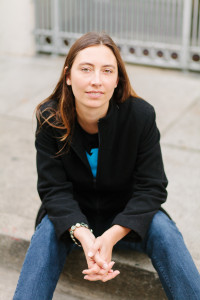Ramsey Hootman‘s first novel is “Courting Greta,” and she also penned a memoir (“Chastity Belt Included“) featured in our “Bedeviled” issue.
Update for March 2017: Hootman’s second novel, Surviving Cyril, has just been released for enjoyment on Kindle! Making this an excellent moment to revisit her 2015 Spotlight interview …
A San Francisco area resident, Hootman perfects the balancing act of mother and writer. We’re impressed. So we asked her some questions about truth, writing and the role honesty plays in her craft.
What role does truth play in your writing–your nonfiction, certainly, but also any other genre in which you work?
Most of us live within a web of small, comfortable lies. We tell ourselves stories about love and death and life, and these stories are so warm and safe that we prefer living inside of them to what is perhaps a harsher, less polished reality. I try to unmask those lies and show how reality can be, in its own way, more rewarding and beautiful if we simply have the courage to see it.
How does honesty in storytelling affect the voice in which you write a particular piece?
My writing has been described as “unapologetic.” I think that’s accurate. I try not to romanticize or filter anything for my own comfort or the comfort of my readers. The people I write about have bad sex and use the toilet. These things are just as much a part of the human experience as anything else. They deserve room.
How do you determine something is worth writing about?
I know everything has already been said before, but for me it’s important that I’m not just rehashing what’s already out there. Even if I’m telling a story that’s similar to others, I want my take on it to be fresh and informative.
What do you find most challenging about writing the truth?
It means confronting things in myself that I would be much more comfortable just ignoring. Often, I start out trying to deconstruct some perceived cultural fallacy and end up convicting myself instead.
When you were a struggling/dreaming new writer, what gave you inspiration and kept you going?
I’ve always taken rejection as a challenge. I delight in upsetting expectations. I don’t know anywhere you can rack up more rejections than in the traditional publishing business, which makes it insanely addictive for a person like me.
What advice do you have for aspiring writers of nonfiction–in any form–and where did you learn that tip?
I used to write newsletters for a travel company. I put my heart into that job, so the occasional angry/offended response was upsetting. My boss always assured me that even a negative response was worthwhile – it meant that I had affected someone, made them think, and prompted them to engage.









